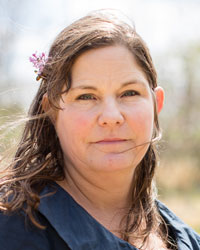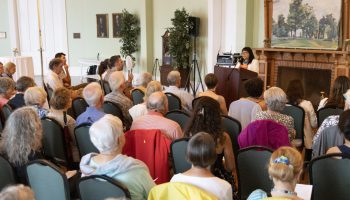During her tenure as the Chautauqua Writers’ Center’s Week Five prose writer-in-residence, Charlotte Matthews said she’ll be asking writers and virtual lecture attendees a question: “What can we find around us?”

“More specifically, what can we find around us during these times of sequestration that can lift us out of the quotidian?” said Matthews, an author and associate professor at The University of Virginia.
The answer to that question may lie in a lemon. Or in an artichoke. Or in a willow tree.
“For those in my workshop, I’m going to give a lot of prompts that are going to say, for instance: ‘Do you have a lemon in your house?’” Matthews said. “If so, it’ll say: ‘Get it.’ Then they’ll write about it, or whatever they have. Maybe they can go outside, maybe they have a willow tree they want to write about.”
Matthews’ emphasis on using everyday life in writing will also extend to her Brown Bag lecture, titled “Let’s Consider the Converse of Bewilderment: Deep Noticing,” which will take place at 12:30 p.m. EDT on Friday, July 31, on the CHQ Assembly Virtual Porch. Matthews’ published works include a memoir, Comes with Furniture and People and three poetry collections: Still Enough to Be Dreaming, Green Stars and Whistle What Can’t Be Said.
Comes with Furniture was made, Matthews said, by piecing together “parcels of essayettes” about 800 words apiece.
“I’ve been compiling them for the past decade,” she said. “It’s made up of observations of the world around me, and also as a way to heal from difficult childhood experiences. I’m a cancer survivor of stage-three breast cancer. I’ve been through a lot in my life, so this book is a way of looking at the world more closely, and contending with what might be difficult.”
Though Matthews said she loves poetry — which she refers to as “a self-contained blast of energy” — she wanted something that could allow her to breath when writing her memoir.
In addition to Comes with Furniture, Matthews’ forthcoming novel Collapsible Mannequin uses the power of everyday observations to tell the story of a boy with autism who has a penchant for balloons.
“He starts setting these balloons free, and attaches these little notes to them that say, ‘If you find these balloons, please write me back,’ and so he begins a correspondence,” she said. “The boy lives with his mother, who keeps the fact that his father ran out on both of them a secret.”
Lately, amid the COVID-19 pandemic and quarantine, Matthews said she’s been rereading William Butler Yeats’ poem “The Second Coming” because of its prescience.
“It goes: ‘Turning and turning in the widening gyre / The falcon cannot hear the falconer / Things fall apart; the centre cannot hold,’” she said. “That poem haunts me.”




